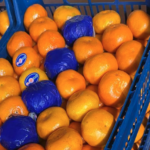Spanish citrus industry makes fresh calls to ban South African citrus

The Valencian Agriculture Association (AVA-ASAJA) has asked the European Union to immediately ban entry of South African citrus, following 17 detections of black spot in the nation's exports, Europa Press reported.
The European Union had previously set a maximum limit of five black spot detections for South African citrus. The nation has now reached 17 reported detections, following nine new reported cases in the month of September by EU inspectors.
AVA-ASAJA said the number of detections has now reached a record level, calling the import data "increasing eloquent and disturbing."
Organization president Cristóbal Aguado offered biting words criticizing the South African industry.
"This shows without a doubt that the plant health problem in South Africa is absolutely out of control," Aguado said.
"The level of disease infestation present in a great number of shipments sent to Europe poses a potential risk of new disease exposure in our citrus industry on such a magnitude that the European Commission has the obligation to close borders to this ticking time bomb that has arisen from South African citrus."
In September, the South African Ministry of Agriculture announced that it would be suspending citrus shipments to Europe from black spot risk zones. Given the delay in maritime arrivals, however, a large quantity of South African fruit has arrived in European ports since then, sparking much of the indignation currently expressed by the Spanish industry.
According to the organization, a recent EU phytosanitary meeting established that a new detection had been made in South African fruit as recently as last week.
"The establishment of the date of Oct. 3 is not a coincidence since we have to take into account that South Africa's decision to suspend exports came on Sept. 18 and that the shipping route from the country to European shores takes around 15 days, which means that around 50,000 tons of South African citrus are currently in European ports," AVA-ASAJA said.
Aguado called out the EU's failure to comply with its previously established limit of five detections and called the commission's actions to date "largely contemplative."
"The problem repeats itself year after year and we demand the immediate closure of borders - a closure that should extend to next season and be maintained until South Africa is capable of guaranteeing the export of citrus with adequate plant health," Aguado said.
Related story: South Africa imposes restrictions on citrus shipments to EU
















































